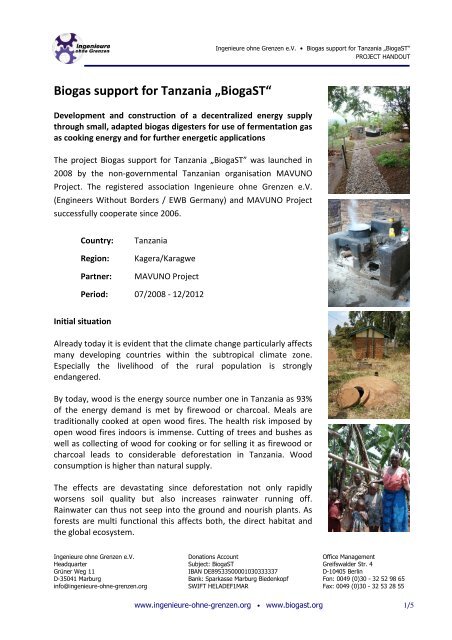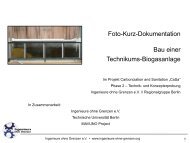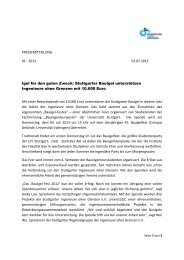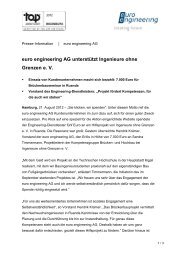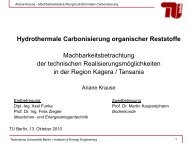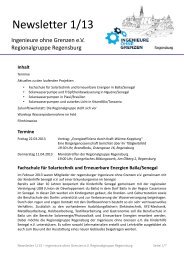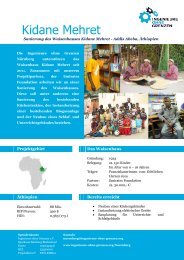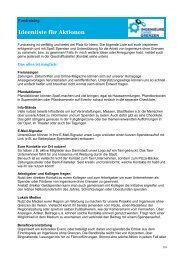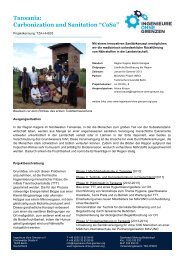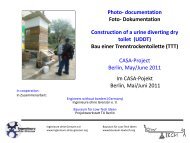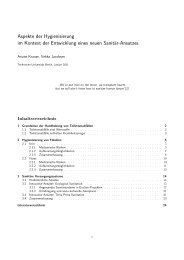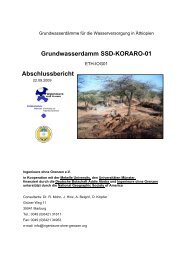Biogas support for Tanzania „BiogaST“ - Ingenieure ohne Grenzen
Biogas support for Tanzania „BiogaST“ - Ingenieure ohne Grenzen
Biogas support for Tanzania „BiogaST“ - Ingenieure ohne Grenzen
Create successful ePaper yourself
Turn your PDF publications into a flip-book with our unique Google optimized e-Paper software.
<strong>Biogas</strong> <strong>support</strong> <strong>for</strong> <strong>Tanzania</strong> <strong>„BiogaST“</strong><br />
<strong>Ingenieure</strong> <strong>ohne</strong> <strong>Grenzen</strong> e.V. • <strong>Biogas</strong> <strong>support</strong> <strong>for</strong> <strong>Tanzania</strong> <strong>„BiogaST“</strong><br />
PROJECT HANDOUT<br />
Development and construction of a decentralized energy supply<br />
through small, adapted biogas digesters <strong>for</strong> use of fermentation gas<br />
as cooking energy and <strong>for</strong> further energetic applications<br />
The project <strong>Biogas</strong> <strong>support</strong> <strong>for</strong> <strong>Tanzania</strong> „BiogaST” was launched in<br />
2008 by the non-governmental <strong>Tanzania</strong>n organisation MAVUNO<br />
Project. The registered association <strong>Ingenieure</strong> <strong>ohne</strong> <strong>Grenzen</strong> e.V.<br />
(Engineers Without Borders / EWB Germany) and MAVUNO Project<br />
successfully cooperate since 2006.<br />
Country: <strong>Tanzania</strong><br />
Region: Kagera/Karagwe<br />
Partner: MAVUNO Project<br />
Period: 07/2008 - 12/2012<br />
Initial situation<br />
Already today it is evident that the climate change particularly affects<br />
many developing countries within the subtropical climate zone.<br />
Especially the livelihood of the rural population is strongly<br />
endangered.<br />
By today, wood is the energy source number one in <strong>Tanzania</strong> as 93%<br />
of the energy demand is met by firewood or charcoal. Meals are<br />
traditionally cooked at open wood fires. The health risk imposed by<br />
open wood fires indoors is immense. Cutting of trees and bushes as<br />
well as collecting of wood <strong>for</strong> cooking or <strong>for</strong> selling it as firewood or<br />
charcoal leads to considerable de<strong>for</strong>estation in <strong>Tanzania</strong>. Wood<br />
consumption is higher than natural supply.<br />
The effects are devastating since de<strong>for</strong>estation not only rapidly<br />
worsens soil quality but also increases rainwater running off.<br />
Rainwater can thus not seep into the ground and nourish plants. As<br />
<strong>for</strong>ests are multi functional this affects both, the direct habitat and<br />
the global ecosystem.<br />
<strong>Ingenieure</strong> <strong>ohne</strong> <strong>Grenzen</strong> e.V. Donations Account Office Management<br />
Headquarter Subject: BiogaST Greifswalder Str. 4<br />
Grüner Weg 11 IBAN DE89533500001030333337 D-10405 Berlin<br />
D-35041 Marburg Bank: Sparkasse Marburg Biedenkopf Fon: 0049 (0)30 - 32 52 98 65<br />
info@ingenieure-<strong>ohne</strong>-grenzen.org SWIFT HELADEF1MAR Fax: 0049 (0)30 - 32 53 28 55<br />
www.ingenieure-<strong>ohne</strong>-grenzen.org • www.biogast.org 1/5
<strong>Ingenieure</strong> <strong>ohne</strong> <strong>Grenzen</strong> e.V. • <strong>Biogas</strong> <strong>support</strong> <strong>for</strong> <strong>Tanzania</strong> <strong>„BiogaST“</strong><br />
PROJECT HANDOUT<br />
Many people in <strong>Tanzania</strong> are directly or indirectly dependent on agriculture. The population has<br />
to cope with these dramatic changes. Already today, the crop yields are hardly sufficient to<br />
survive. Most likely, the yields will further decline in the near future. The basis of food security<br />
is threatened. Migration movements occur since the population is compelled to escape from<br />
such severe living conditions. This project provides an approach to mitigate these problems.<br />
Objective of the project<br />
<strong>Biogas</strong> <strong>support</strong> <strong>for</strong> <strong>Tanzania</strong> „BiogaST” helps to improve the rural population’s living conditions<br />
in the Kagera region, one of the poorest regions in <strong>Tanzania</strong>. This is to be reached by the<br />
development and construction of a decentralized energy supply through small, adapted biogas<br />
digesters <strong>for</strong> the use of fermentation gas as cooking energy and <strong>for</strong> further energetic<br />
applications. The sustainability of this project is ensured by accompanying training and<br />
education in environmental friendly technology to assure the acceptance of this project among<br />
the local population. The entire concept is implemented in a “help of themselves” manner<br />
thereby fulfilling at least two of the United Nations Millennium Development Goals (MDG), in<br />
particular Goal 7 (“Ensure environmental sustainability”) and Goal 8 (“Develop a global<br />
partnership <strong>for</strong> development”).<br />
A further objective of the project is to improve the health conditions of the people. The risk of<br />
respiratory diseases and ophthalmitis through smoke exposure (indoor pollution) is mitigated<br />
through the application of biogas instead of firewood. Life quality of the population is<br />
considerably enhanced using gas lamps since they are a simple and safe source of light after<br />
nightfall. In addition, collecting of firewood is no longer necessary: in the Kagera region an<br />
average of 2 km walk everyday is necessary to collect firewood. This is mostly done by children.<br />
Another by-product of the biogas plant operation is the opportunity to use fermented<br />
substrates as fertilizer to enhance soil quality and soil fertility which in turn has a positive effect<br />
on the local agriculture. Thus, application of biogas can help to promote regional economy by<br />
substitution of resources and optimised use of nutrients in the life cycle.<br />
Target group<br />
Farmer households are the main target group <strong>for</strong> the implementation of biogas digesters.<br />
Especially women and children benefit from the positive effects entailed by the use of biogas.<br />
The promotion of the local economy through the plant construction and training and education<br />
in renewable energies in general could help to improve the income situation of an entire<br />
population. During the exploration (phase 1), the utilisation of residues (e.g. from agriculture)<br />
was discovered as a potential <strong>for</strong> fermentation process.<br />
<strong>Ingenieure</strong> <strong>ohne</strong> <strong>Grenzen</strong> e.V. Donations Account Office Management<br />
Headquarter Subject: BiogaST Greifswalder Str. 4<br />
Grüner Weg 11 IBAN DE89533500001030333337 D-10405 Berlin<br />
D-35041 Marburg Bank: Sparkasse Marburg Biedenkopf Fon: 0049 (0)30 - 32 52 98 65<br />
info@ingenieure-<strong>ohne</strong>-grenzen.org SWIFT HELADEF1MAR Fax: 0049 (0)30 - 32 53 28 55<br />
www.ingenieure-<strong>ohne</strong>-grenzen.org • www.biogast.org 2/5
Course of the project<br />
<strong>Ingenieure</strong> <strong>ohne</strong> <strong>Grenzen</strong> e.V. • <strong>Biogas</strong> <strong>support</strong> <strong>for</strong> <strong>Tanzania</strong> <strong>„BiogaST“</strong><br />
PROJECT HANDOUT<br />
Phase 5 - Further development of plant technology and construction<br />
of new digesters in <strong>Tanzania</strong> (phase in progress)<br />
The ongoing phase 5 (11/2011 - 12/2012) compasses following goals:<br />
• Education of an expert <strong>for</strong> the biogas lab and the plant operation<br />
• Enhancement of the plant technology<br />
• Optimisation of the heating system<br />
• Construction of 14 new digesters <strong>for</strong> rural households<br />
• Qualification of the consisting construction team<br />
• Education of new construction teams<br />
• Training of the residents<br />
• Establishing a maintenance system <strong>for</strong> the digesters<br />
Phase 4 - Evaluating and optimising phase in <strong>Tanzania</strong> (terminated)<br />
An evaluation of the new pilot digester at MAVUNO Project site was<br />
carried out in phase 4 (03/2011 - 04/2011). Subsequently, the plant<br />
design was optimised in order to improve the plant operation prior to<br />
the construction of further digesters within the region.<br />
Phase 3 - Implementation in <strong>Tanzania</strong> (terminated)<br />
Phase 3 (08/2010 - 11/2010) covered the construction of the pilot<br />
digester at the MAVUNO Project site in <strong>Tanzania</strong>. Additionally, the<br />
training and education concept was initiated covering the following<br />
aspects:<br />
• Basics of the biogas technology<br />
• Construction of digester<br />
• Commissioning of the digester and the plant operation<br />
• <strong>Biogas</strong> usage<br />
• Repair and maintenance<br />
Experiences and findings of the first two phases were trans<strong>for</strong>med<br />
into the real plant design. An intensive communication with the local<br />
partner MAVUNO Project was valuable to adapt the plant design to<br />
the local needs and habits.<br />
<strong>Ingenieure</strong> <strong>ohne</strong> <strong>Grenzen</strong> e.V. Donations Account Office Management<br />
Headquarter Subject: BiogaST Greifswalder Str. 4<br />
Grüner Weg 11 IBAN DE89533500001030333337 D-10405 Berlin<br />
D-35041 Marburg Bank: Sparkasse Marburg Biedenkopf Fon: 0049 (0)30 - 32 52 98 65<br />
info@ingenieure-<strong>ohne</strong>-grenzen.org SWIFT HELADEF1MAR Fax: 0049 (0)30 - 32 53 28 55<br />
www.ingenieure-<strong>ohne</strong>-grenzen.org • www.biogast.org 3/5
Phase 2 - Research and development in Germany (terminated)<br />
<strong>Ingenieure</strong> <strong>ohne</strong> <strong>Grenzen</strong> e.V. • <strong>Biogas</strong> <strong>support</strong> <strong>for</strong> <strong>Tanzania</strong> <strong>„BiogaST“</strong><br />
PROJECT HANDOUT<br />
In phase 2 (08/2009 - 07/2010), two pilot biogas digesters were constructed in Germany<br />
(Stuttgart and Berlin) in collaboration with the University Hohenheim and the Technical<br />
University Berlin. The research was mainly focused on the gas conversion process itself as well<br />
as the process engineering. Both plants were operated inside a green house in order to simulate<br />
sub-saharan climate conditions. Phase 2 has been divided into a development and construction<br />
phase on the one side and an operation and research phase on the other side.<br />
A plant design which takes the local conditions in <strong>Tanzania</strong> into<br />
account was the aim of this phase. The following main requirements<br />
were integrated in the digester’s design: operation of the digester<br />
using predominantly plant residues, minimum water consumption of<br />
the digester compared to regular biogas plants and usage of local<br />
resources and raw materials <strong>for</strong> the construction of the digester.<br />
Parallel to this technically focused research, a training and education<br />
concept based on ethnological aspects was compiled. Great ef<strong>for</strong>ts<br />
were made to develop a concept that regards social and sociological<br />
factors and educates local craftsmen in plant construction as well as<br />
in plant operation.<br />
Phase 1 - Feasibility study in <strong>Tanzania</strong> (terminated)<br />
A feasibility study was carried out in phase 1 (07/2008 - 04/2009).<br />
<strong>Ingenieure</strong> <strong>ohne</strong> <strong>Grenzen</strong> e.V. conducted an assessment in the<br />
Kagera region focusing on the local conditions such as the climate,<br />
the available building materials and substrates (feedstock <strong>for</strong> the<br />
biogas plant) as well as the local energy needs. In addition, a biogas<br />
lab was set up during a two month exploration trip to the partner<br />
organization MAVUNO Project in <strong>Tanzania</strong>. The biogas lab was used<br />
to analyze the available substrates.<br />
Furthermore, the study showed that state-of-the-art biogas digester<br />
design is not feasible <strong>for</strong> the Kagera region, as sufficient livestock is<br />
rarely available. Instead, the plant has to operate with crop residues.<br />
The second limitation is the high water consumption of existing types<br />
of digesters. The newly developed small-scale biogas digester needs<br />
to operate even during drought periods when no fresh water is<br />
available.<br />
<strong>Ingenieure</strong> <strong>ohne</strong> <strong>Grenzen</strong> e.V. Donations Account Office Management<br />
Headquarter Subject: BiogaST Greifswalder Str. 4<br />
Grüner Weg 11 IBAN DE89533500001030333337 D-10405 Berlin<br />
D-35041 Marburg Bank: Sparkasse Marburg Biedenkopf Fon: 0049 (0)30 - 32 52 98 65<br />
info@ingenieure-<strong>ohne</strong>-grenzen.org SWIFT HELADEF1MAR Fax: 0049 (0)30 - 32 53 28 55<br />
www.ingenieure-<strong>ohne</strong>-grenzen.org • www.biogast.org 4/5
<strong>Ingenieure</strong> <strong>ohne</strong> <strong>Grenzen</strong> e.V. • <strong>Biogas</strong> <strong>support</strong> <strong>for</strong> <strong>Tanzania</strong> <strong>„BiogaST“</strong><br />
PROJECT HANDOUT<br />
The project <strong>Biogas</strong> <strong>support</strong> <strong>for</strong> <strong>Tanzania</strong> „BiogaST” is a joint project of the regional group<br />
Berlin and the competence group renewable energies of <strong>Ingenieure</strong> <strong>ohne</strong> <strong>Grenzen</strong> e.V. (EWB<br />
Germany). It is carried out in collaboration with the <strong>Tanzania</strong>n partner organisation MAVUNO<br />
Project as well as further cooperating partners.<br />
Project leader competence group renewable energies<br />
Gordon Appel<br />
gordon.appel@ingenieure-<strong>ohne</strong>-grenzen.org<br />
Project leader regional group Berlin<br />
Philipp Becker (till July 2012 in <strong>Tanzania</strong>)<br />
philipp.becker@ingenieure-<strong>ohne</strong>-grenzen.org<br />
Karen Bremert (Substitute in Germany)<br />
karen.bremert@ingenieure-<strong>ohne</strong>-grenzen.org<br />
Documentation and public relations<br />
Catherina Clausnitzer (till July 2012 in <strong>Tanzania</strong>)<br />
catherina.clausnitzer@ingenieure-<strong>ohne</strong>-grenzen.org<br />
Silke Bartlick (Substitute in Germany)<br />
silke.bartlick@ingenieure-<strong>ohne</strong>-grenzen.org<br />
<strong>Ingenieure</strong> <strong>ohne</strong> <strong>Grenzen</strong> e.V. Donations Account Office Management<br />
Headquarter Subject: BiogaST Greifswalder Str. 4<br />
Grüner Weg 11 IBAN DE89533500001030333337 D-10405 Berlin<br />
D-35041 Marburg Bank: Sparkasse Marburg Biedenkopf Fon: 0049 (0)30 - 32 52 98 65<br />
info@ingenieure-<strong>ohne</strong>-grenzen.org SWIFT HELADEF1MAR Fax: 0049 (0)30 - 32 53 28 55<br />
www.ingenieure-<strong>ohne</strong>-grenzen.org • www.biogast.org 5/5


